Alcove Studio Guide in NYC
Go Back To Previous Page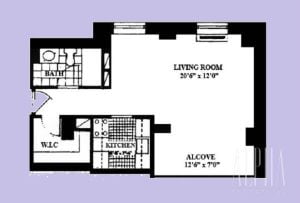 Apartments in NYC are some of the most expensive apartments in the country. Due to this fact, many people live in smaller apartments than they would in other cities to drive the cost down. This has led to the popularity of studio apartments in NYC since they’re far cheaper, on average than a one-bedroom apartment, especially two-bedroom units. But some people don’t like the idea of just having one space act as the bedroom, kitchen, and living area. Thus, the alcove studio apartment was born. In this guide, you’ll learn everything about these units. We will include what they are, how much they cost, and some benefits and disadvantages of alcove studio apartments in NYC.
Apartments in NYC are some of the most expensive apartments in the country. Due to this fact, many people live in smaller apartments than they would in other cities to drive the cost down. This has led to the popularity of studio apartments in NYC since they’re far cheaper, on average than a one-bedroom apartment, especially two-bedroom units. But some people don’t like the idea of just having one space act as the bedroom, kitchen, and living area. Thus, the alcove studio apartment was born. In this guide, you’ll learn everything about these units. We will include what they are, how much they cost, and some benefits and disadvantages of alcove studio apartments in NYC.
What is an Alcove Studio Apartment in NYC?
An alcove studio is a studio apartment with an additional alcove space on the main room’s far side. In other words, an alcove studio is a studio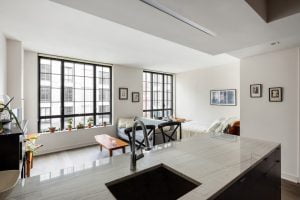 apartment with a separate sleeping area on either side at the far end of the main room. This nook or “alcove” is typically left open to the main room, and it generally is only large enough to fit a modestly sized bed.
apartment with a separate sleeping area on either side at the far end of the main room. This nook or “alcove” is typically left open to the main room, and it generally is only large enough to fit a modestly sized bed.
People use this nook as a sleeping space, typically situated away from the main door, to provide additional privacy.
Sometimes, you can use the nook as a dining area or home office. Still, people commonly use it as a sleeping nook, and you can convert larger alcove studios into one-bedroom apartments by putting up a wall. This is what makes them so desirable.
However, most alcoves are small and big enough to fit a queen or king-sized bed, so it certainly doesn’t replace a typical one-bedroom apartment.
What do Alcove Studio Apartments Cost?
The first question many people will ask is, do alcove studios cost more than a standard studio apartment? Yes, they do! Since they have the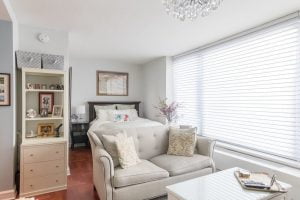 additional sleeping space separated from the living area, they demand a higher price than traditional studio apartments.
additional sleeping space separated from the living area, they demand a higher price than traditional studio apartments.
They also cost less than a whole one-bedroom apartment since they’re technically just a studio. In downtown Manhattan, a condo studio costs 500 to 600k, and a 1-bedroom ranges from 800k to 1mm. Therefore an alcove studio would be in the middle. For coops, it’s about 25% less.
This situation makes them an affordable option for anyone looking to get an apartment without paying the exorbitant prices that come with a standard one-bedroom. They are priced relatively for precisely what they are: a bridge between a studio apartment and a one-bedroom apartment.
Whether you’re renting or buying, you can expect an alcove studio to cost more than a regular studio as you get more space. That being said, if you were to rent an alcove studio that’s the same size as a one-bedroom apartment (let’s say they’re both 650 Square feet), you’d pay less.
In NYC, the discount can often be 10% or more, which is significant, considering you have the same amount of living space. These savings make alcove studios extremely popular, especially among renters. It is getting increasingly difficult to find alcove studios for rent in NYC, though, as many landlords are simply converting them to one-bedroom apartments to charge a higher rent.
What are the Dimensions of an Alcove Studio Apartment?
There aren’t any set rules or dimensions for an alcove studio apartment. Even though it provides an additional sleeping area, the apartment is technically a studio, and brokers must list them. But the alcove must add much living space to the overall floor plan, right?
Not exactly.
To create a legal bedroom in NYC, the room must be a minimum of 8 feet x 8 feet. This definition means at least 64 square feet of living space. If the alcove were at least that big, then the developers who built it would’ve likely just walled it off and made the apartment a one-bedroom unit to get the maximum value out of it.
That said, the additional space created by the alcove in an alcove studio apartment will typically be less than 64 square feet. You will commonly see an alcove that’s something like 8 feet by 5 feet or 8 feet by 6 feet, which results in an additional space of 40 or 48 square feet.
This means that you won’t fit a big Alaskan-king-sized bed or anything. However, you will include a modest bed in the space to separate the sleeping and living areas. Plus, a 48-square-foot increase in an otherwise 500-square-foot unit is still increasing by nearly 10%, and it’s pretty significant!
Can You Put Up a Wall In an NYC Alcove Studio?
If you’re new to NYC, you might assume that you can put up a wall- it’s your apartment, after all, and who’s to stop you from doing what you’d like within your four walls? But there are various regulations about putting up temporary walls in NYC. As a general rule, you’ll need permission from your building or management company to put up a flex wall.
While this can be annoying, and a wall can cost over $1,000 to put up, it would still represent a saving over a one-bedroom in most cases. If you don’t want the headache of putting up a full wall, you can put up a divider without asking permission.
This can be either a curtain, a screen, or a furniture divider like a bookshelf. Remember, bookshelf walls are considered furniture as long as they don’t reach the ceiling and require no permission.
Pros and Cons of an Alcove Studio in NYC
Pros:
- More affordable than a one-bedroom. The most significant benefit of buying an alcove studio apartment is that it’s much cheaper than a regular one-bedroom unit
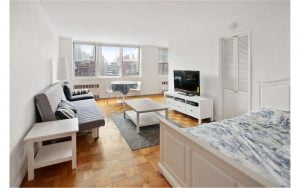 . You can save much money in NYC by getting an alcove studio instead of a one-bedroom.
. You can save much money in NYC by getting an alcove studio instead of a one-bedroom. - Increased square footage. The alcove adds some square footage to a studio apartment that’s otherwise typically very small. In some studios in NYC, the alcove can add up to 10% square footage.
- Separated spaces within a studio. The additional space help create the illusion of separate areas unheard of in most studio apartments.
Cons:
- More expensive than a standard studio. Though these are cheaper than a one-bedroom apartment, they’re still more costly than a
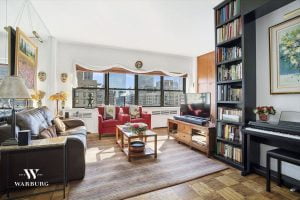 traditional studio. A d at the end of the day, you still live in a studio apartment.
traditional studio. A d at the end of the day, you still live in a studio apartment. - All areas are still open to each other. Though the alcove helps create the illusion that there are separate living spaces, everything is still one big room. Your bedroom remains connected to everything else with no actual separation. Also, this “bedroom” is tiny, to begin with.
- You are paying a premium for the tiny amount of increased space. These apartments are more expensive than a standard studio, but you also pay a premium for that extra square footage. If space is increasing by about 5-10%, but if you’re paying 15%+ more, that extra space costs you a lot for what you get.
Are alcove studios the same as Junior one bedrooms?
While a junior one bedroom will have a similar layout to an alcove studio, the extra space in a junior one will generally be a separate room. This is why it’s more common to see a junior one-bedroom apartment advertised as a studio + home office.
This separate room can serve as a bedroom. Brokers cannot legally call it a bedroom as it might not have a closet or window. This means a junior-1 can be more or less desirable than an alcove studio. Some might prefer the privacy of this additional room.
But an ideal alcove studio might have a windowed alcove, and the owner can convert it into a better bedroom than what you’d find in most junior 1s.


